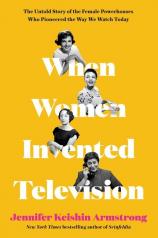When Women Invented Television: The Untold Story of the Female Powerhouses Who Pioneered the Way We Watch Today
Review
When Women Invented Television: The Untold Story of the Female Powerhouses Who Pioneered the Way We Watch Today
Gertrude Berg. Hazel Scott. Irna Phillips. Betty White. Yes, that Betty White. Everyone’s favorite Golden Girl. But kids, these women were all that back in the day and more.
Jennifer Keishin Armstrong, author of SEINFELDIA, has brought their stories together with nontrivial research in a wiz-bang historical look at the early days of television and how these actresses from different media became the first ladies of the burgeoning possibilities of our good friend during the pandemic (and otherwise) --- the wondrous world of television. WHEN WOMEN INVENTED TELEVISION reads like a thriller, moving you through vast amounts of information in no time as you cheer for these real-life protagonists to pave the way for Oprah, Ellen and Joan Ganz Cooney, the creator of “Sesame Street.”
Gertrude Berg came from the world of radio, where “The Goldbergs,” a Jewish family saga, was one of the highest rated shows in broadcasting. She was already in her 50s, with teenagers in the house, when she took on the responsibility of adapting her radio show to television. She was the first “influencer” to ensure that her work had many ancillary outlets for monetary success.
"WHEN WOMEN INVENTED TELEVISION will ensure that the stories of these innovative, hard-working, inspirational, individualistic ladies are known to everyone who aspires to the same."
Hazel Scott, a renowned jazz musician, was the first woman to produce and star on a live variety show. She had spent half her life on the road, playing for the likes of Ella Fitzgerald and others. She was ready to get off the road and settle in with her husband, Senator Adam Clayton Powell Jr., who served in Congress from 1945 to 1971. But the possibilities of broadcast television proved a strong magnet for her skills, talents and beauty.
Irna Phillips took the idea of the soap opera serial and planted it front and center for millions of Americans, a tradition refashioned by cultures all over the world to represent the people of their country. She understood deeply the connection between stories and the kind of audience that television would normalize --- thousands of viewers sharing in the lives of these characters at the same time every day --- but the process caused her lifelong illness and anxiety.
Betty White, the oldest host ever of “Saturday Night Live,” started on a talk show and went on to write, produce and star in her own weekly series. She already had been married twice and didn’t care about sharing duties with anyone as she tried to become a household name (until years later when she would meet the host of “Password,” Allen Ludden, and find true love for nearly two decades).
Armstrong belongs to my generation of television fanatics, the ones for whom TV Guide was the most important part of the week, the kids who watched anything and everything with absolute glee. Afternoon TV in the ’70s and ’80s was riddled with female-friendly shows (“I Love Lucy,” “The Brady Bunch,” game shows galore), and the sound of the words “Filmed before a live audience in Burbank, California” was mysterious and magical. Those of us who have worked professionally in television broadcasting watched women struggle even in the ’90s and 2000s, so looking at the hard-won successes of these ladies in the late ’40s and ’50s can only inspire those who are just entering the industry. Yes, it’s hard, but it’s also ready for another level of creativity and ingenuity. Of course, it has changed so much, but these stories are exciting and will make an impression on even the most tech-savvy Zoomers.
Armstrong’s style is easy to read, and I found myself whipping through the book as if it were a grade-school paperback. She tells an important story to which lots of people have paid pomp and circumstance, but it is my hope that this tome will cement the contributions of these women on the memories of all the streamers, YouTubers, gamers and other content creators who feel like they are writing new paths forward. Whether they are aware of it or not, WHEN WOMEN INVENTED TELEVISION will ensure that the stories of these innovative, hard-working, inspirational, individualistic ladies are known to everyone who aspires to the same.
Reviewed by Jana Siciliano on June 4, 2021
When Women Invented Television: The Untold Story of the Female Powerhouses Who Pioneered the Way We Watch Today
- Publication Date: March 23, 2021
- Genres: Biography, Entertainment, History, Nonfiction, Performing Arts
- Hardcover: 352 pages
- Publisher: Harper
- ISBN-10: 0062973304
- ISBN-13: 9780062973306



